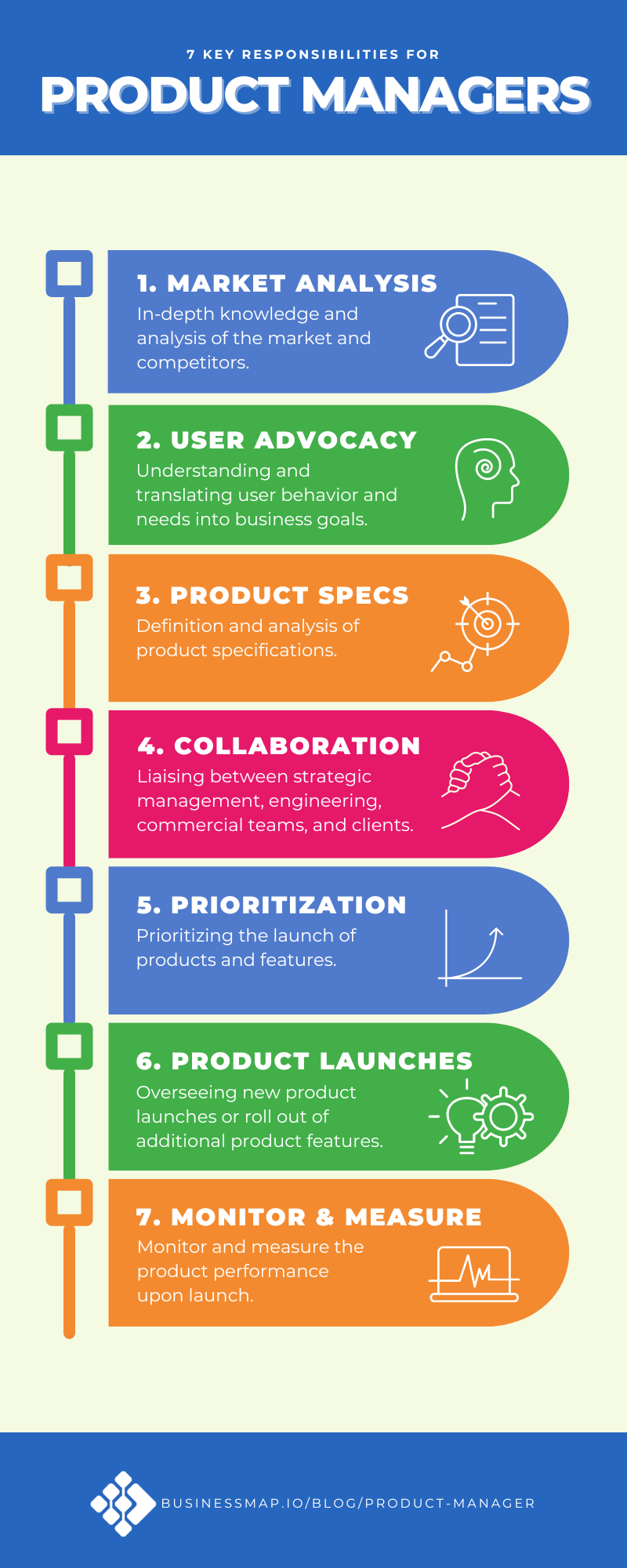Product management is booming. Indeed ranked senior product manager as the #5 best job of 2023, and the average US salary reached $157,000 in 2023. According to Glassdoor, top tech companies can offer PMs even more, with salaries ranging from $250,000 to $300,000 or even higher.
Whether you're aspiring to pursue a career as a product manager or embarking on your journey as one, grasping the complexity of the role and responsibilities is crucial. To excel as a product manager, you must comprehend various facets including stakeholder management, product development lifecycle, business objectives, user experience, and beyond.
Essentially, product management serves as the nexus where UX, technology, and business converge.
What Is a Product Manager?
A product manager (PM) is the strategic mastermind behind a product's success. They act as the bridge between business objectives, user needs, and technical execution.
The job of a product manager is part of the product management function in every company.
Product managers are involved in the specification of product requirements, the execution of a product launch, reporting on user behavior, and further product strategy development. The presence of PMs is essential during all the stages of a product lifecycle.
What Does a Product Manager Do?
Product managers (PMs) are the strategic backbone of product development. Here's what project managers do:
| Core Responsibility | Explanation |
| Defining Product Vision & Strategy | PMs lead the charge in defining the product's purpose and direction. They analyze market trends, conduct user research, and collaborate with stakeholders to create a clear vision that aligns with the company's overall strategy. |
| Discovering User Needs | Understanding user needs is paramount for PMs. They employ various methods like user interviews, surveys, and usability testing to gain deep insights into user pain points, desires, and expectations. |
| Developing Product Roadmaps | PMs translate the product vision into a concrete roadmap, outlining the product's features, development timeline, and release schedule. They prioritize tasks and ensure the roadmap is flexible to adapt to changing needs. |
| Prioritizing Tasks & Features | PMs juggle multiple tasks and prioritize features based on their impact on users and the business. They weigh factors like user needs, market demands, technical feasibility, and resource availability. |
| Collecting & Incorporating Feedback | PMs actively gather feedback from users, stakeholders, and internal teams throughout the product lifecycle. They analyze this feedback, identify areas for improvement, and incorporate it into future product iterations. |
| Determining Success Metrics | Defining how success is measured is crucial. PMs establish key performance indicators (KPIs) to track a product's performance and gauge its effectiveness in achieving its goals. |
| New Product Development | PMs may be involved in new product development, leading the process of identifying opportunities, conducting market research, and shaping the product concept. |
| Budgeting | While not always a primary responsibility, some PMs may also contribute to budgeting for the product team, ensuring resources are allocated effectively to achieve product goals. |
What Are the Responsibilities of a Product Manager?
The 7 critical responsibilities of the product manager's function include an in-depth understanding of the market, product specification analysis, and overseeing the launch of new products or features. While the list is not exhaustive, the key tactical and strategic responsibilities that highlight the importance of product managers in agile companies are listed below.
- In-depth knowledge and analysis of the market and competitors.
- Understanding and translating user behavior and needs into business goals.
- Definition and analysis of product specifications.
- Liaising between strategic management, engineering, commercial teams, and clients.
- Prioritizing the launch of products and features.
- Overseeing new product launches or roll out of additional product features.
- Monitor and measure the product performance upon launch.

What Is the Importance of a Product Manager for Companies?
Product managers are a key part of any company. They are the ones who manage the development and marketing of products. They should also be able to plan, conceptualize, and advertise those products and develop a product roadmap for creating comprehensive product strategies.
On one hand, product managers need to ensure that the products they are managing meet all the needs and wants of their customers.
On the other, the role of agile product management is to create synchronization and cohesion across teams and departments to ensure successful product launches. Last but not least, product managers' performance is critical for driving a company's market share, revenues and profits.
What Are the Disadvantages of the Absence of a Product Manager?
The lack of a product manager hides risks for the company's product strategy, launching products, and managing the product development lifecycle.
Since product managers are also responsible to perform market research, analyzing customer feedback, and creating marketing strategies for their products, inadequate product management can compromise these areas too.
Good product managers also bring in-depth knowledge and have years of experience in the industry which is a great advantage for every business.
What Is the Product Manager's Job Description?
It is the Product Manager's responsibility to plan and execute the product throughout the product lifecycle.
This includes prioritizing and gathering customer and product requirements, defining the product vision, and working with sales, marketing, engineering, and support to ensure that customers and revenue goals are met.
As part of the product manager's job, they provide that the product supports the company's strategy and goals.
How to Become a Product Manager?
- Learn the fundamentals of product management.
- Gain a better understanding of how products are managed.
- Understand the industry in which you work.
- Conduct your own product development projects.
- Showcase your work in the form of a portfolio.
Most qualified product managers hold a master's degree in business administration (MBA) or in business management and leadership, both of which are online programs. These programs offer necessary education for product managers, regardless of their length.
Some of the most common interview questions for product managers are:
- What would you say about product management to a stranger?
- Share with me the product(s) you own.
- Who are your customers? What is the size of the customer base?
- How often do you conduct customer research?
- How do you create a product strategy?
- How do you develop your roadmap?
- How do you plan your releases? How do you develop your software?
- What is the frequency of your product releases?
- How do you come up with new features? How do you choose which to build?
- Describe the process of developing a new feature from start to finish.
- Describe the most successful product you have created. How did it become so successful?
- Share a failure you had. Why did it fail? How would you improve it?
- What makes a successful product launch?
- What lessons did you learn from your last launch?
What Are the Critical Product Manager Skills?
The most prominent skills product managers need to be successful are related to their ability to transform business thinking into a strategic approach to achieving the set goals. The list of critical product manager skills includes the following.
- Critical and Analytical Thinking
- Learning Attitude
- Communication and Conflict Resolution
- Customer Management
- User Experience
- Documentation
What Are the Resources to Improve Product Management Skills?
To sharpen your product management knowledge and skills, you can choose from a wide range of certification programs and online training, as well as books. Some of the most praised product management books are listed below:
- The Lean Startup, by Eric Ries
- INSPIRED: How to Create Tech Products Customers Love, by Marty Cagan
- Product Management in Practice: A Real-World Guide to the Key Connective Role of the 21st Century, by Matt LeMay
What Are the Best Practices to Become Successful Product Manager?
Successful product managers develop their skills and build up their knowledge and expertise over years of experience. While there's no single recipe for becoming one, here are some of the best practices that make product managers stand out from the crowd.
Innate drive to understand the ins and outs of the business nature
Efficient product managers go the extra mile to get insights from C-level management, engineering, commercial teams, and customers alike. Only then, once the big picture is clear, can they take adequate decisions and strategize product development initiatives.
Leadership with empathy
Product managers are not simply mediators between shareholders, teams, and customers. Successful product management requires an ability to build up trust in all three groups, to listen and understand them.
Ability to swiftly prioritize
Decision-making is at the heart of the product management role. As such, successful product managers prioritize one decision over another all the time. For instance, the launch of a few products that would satisfy a new demand or work on improvement of existing products that would make current customers happy.
What Are the Product Management Courses to Become a Product Manager?
Product management training programs provide a deep understanding of the organizational function. The courses emphasize the planning, conceptualizing, forecasting, launching, and marketing of products during all stages of their development lifecycle.
- Certified Product Manager®, Certified Product Marketing Manager, Agile Certified Product Manager and Product Owner by the Association of International Product Marketing & Management (AIPMM)
- Product Management Certification by the C. T. Bauer College of Business at the University of Houston and Institute of Product Leadership
- Certified Product Management Specialist (CPMS) by the Global Association for Quality Management (GAQM)
The certifications can help professionals hone their skills or gain new knowledge required at functions such as Product Analyst, Product Marketing Manager, Product Designer, Product Owners, Technical Product Manager, Senior Product Managers, and more.
Who Are the Most Successful Product Managers?
Among the most successful product managers of all time are the names of Elon Musk (product architect of Tesla), Sundar Pichai (CEO of Google), Jules Walter (product leader of Slack), Reid Hoffman (LinkedIn executive chairman), Jeff Bezos (chairman of Amazon), and many more.
What Are the Differences between a Product Manager and a Product Owner?
The main difference between product managers and product owners is the focus of the two positions. Product managers focus on creating a product roadmap and managing the entire product development lifecycle, and product owners support the work completion. The roles also differ in the scope of their daily activities.
While product owners work closer to the execution teams and drive day-to-day work, the product manager conceptualizes the product strategy to be executed.
Another distinguishing responsibility is the ownership and accountability of the two functions. Product managers own the product strategy and product profitability, while product owners are accountable for prioritizing the team backlog.
What Are the Factors that Differentiate Product Managers from Project Managers?
Product managers in Agile organizations are entitled to envision the company product strategy and set the business goals while Agile project managers lead the projects to accomplish these goals.
Depending on the industry, company size, business model, the role of the product manager may differ; however, they usually fall into one of the following types of product management divisions:
- Strategic product management
- Technical product management
- Product marketing management

Iva Krasteva
Content Strategist | Agile Practitioner | Kanban Certified
Iva is a Kanban-certified Agile expert with hands-on experience in SEO, content creation, and Lean practices. She has published dozens of articles on Lean, Agile, and Kanban practical applications. Iva actively promotes collaborative, flexible work environments and regularly shares process optimization insights through writing.



